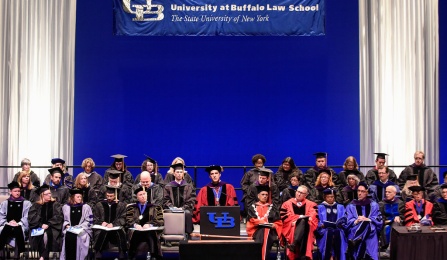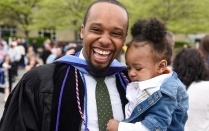Law Links - June 2016
Words of challenge as graduates cross a threshold

No one gets through law school without a cheering section, and as 200 students received their degrees at University at Buffalo School of Law’s 127th Commencement ceremonies, their families and friends did plenty of cheering.
At the May 21 ceremonies, held in the auditorium of UB’s Center for the Arts, 188 J.D. candidates and 12 master of laws candidates crossed the stage as degrees were conferred – and crossed the threshold of their new life as lawyers.
Interim Dean James A. Gardner welcomed the crowd and had some parting words for the Class of 2016. A constitutional law scholar, Gardner noted that in the presidential primary process, “a theme has begun to emerge on the campaign trail: the theme of fraud and the insistence that elections have been or will be stolen.”
Those assertions, he said, though uniformly baseless, speak to a trend in the wider society. “What seems to be happening increasingly in our politics is that some people refuse to acknowledge the possibility that others – sometimes large numbers of others – might actually disagree with them.” That, he said, calls for a professional response. “The lawyer’s job is persuasion,” Gardner said. “Anyone who dismisses opposing arguments out of hand will end up capable of persuading only those who already agree. A good lawyer always anticipates the judge or jury may think differently. To persuade such a decision maker, one must carefully and thoughtfully engage arguments made by the other side – that is, one must pay those arguments sufficient respect to take them apart, see what makes them tick, and then find and exploit their weaknesses.”
The afternoon’s keynote speaker, Robert Odawi Porter, is the former president, attorney general and chief legal counsel of the Seneca Nation of Indians. Porter shared some hard-won lessons about life in the law, encouraging the graduates to think beyond the narrow interests of their careers.
He asked each of them to consider their profession a “personal journey.” “From this day forward,” he said, “it will become increasingly meaningless how well you did here in the Law School as a student. What will matter is whether you’re any good as a lawyer and whether you’re any good as a person. Whether you have a reputation for success, whether you’re honest or not, whether you’re a jerk or not – those are the things that are going to matter.”
Porter also counseled a careful balance between the pursuit of a high salary and the higher calling of the law. “I don’t think there’s any shame in wanting to improve your economic situation,” he said. “But as lawyers we exist to serve our clients. Money is a consequence of some success in the legal profession, but it is not the objective.”
Finally, he encouraged the graduates to be engaged in their community. “Be an active participant in society, whether at the local, state or national level,” he said. “Serve on the school board. Raise money for a charity. Teach a kid how to read. Run for Congress. Whatever you do, it will not only help your legal career, it will make you a better person.”
The student address was given by Ibrahim Tariq, who recounted a moment in Associate Professor Matthew Steilen’s classroom when Steilen – explaining a concept in constitutional law – paused and said, “We’re lawyers. We run this.”
“And he was right,” Tariq said. “We run our society. We know what the law says, but it’s our duty to argue about what the law should mean.” He encouraged his classmates: “Let’s not change the way we fight. Let’s not change the way we argue. Let’s fight civil, let’s argue clean. And let’s not play a part in a spiral down into rancor and animosity. After all, we run this. Let’s run it well.”
An emotional Professor Charles Patrick Ewing presented the Ken Joyce Excellence in Teaching Award posthumously to John R. Nuchereno, who passed away during the first year of the Innocence and Justice Project he was instrumental in creating. Catherine E. Nagel ’98 accepted the award on behalf of her husband and law partner.
Most of the Commencement awards and prizes were conferred at a morning Student Awards convocation [view a list of awards and recipients]. At Commencement, these awards were given:
- The Max Koren Award: Ninteretse Jean Pierre.
- The John N. Bennett Achievement Award: Steven Mafucci and Bridget Steele.
- The Dale S. Margulis Award: Amanda Karpovich.
- The Staff Award: Amy Atkinson.
- The Faculty Award: Bernadette Gargano.
